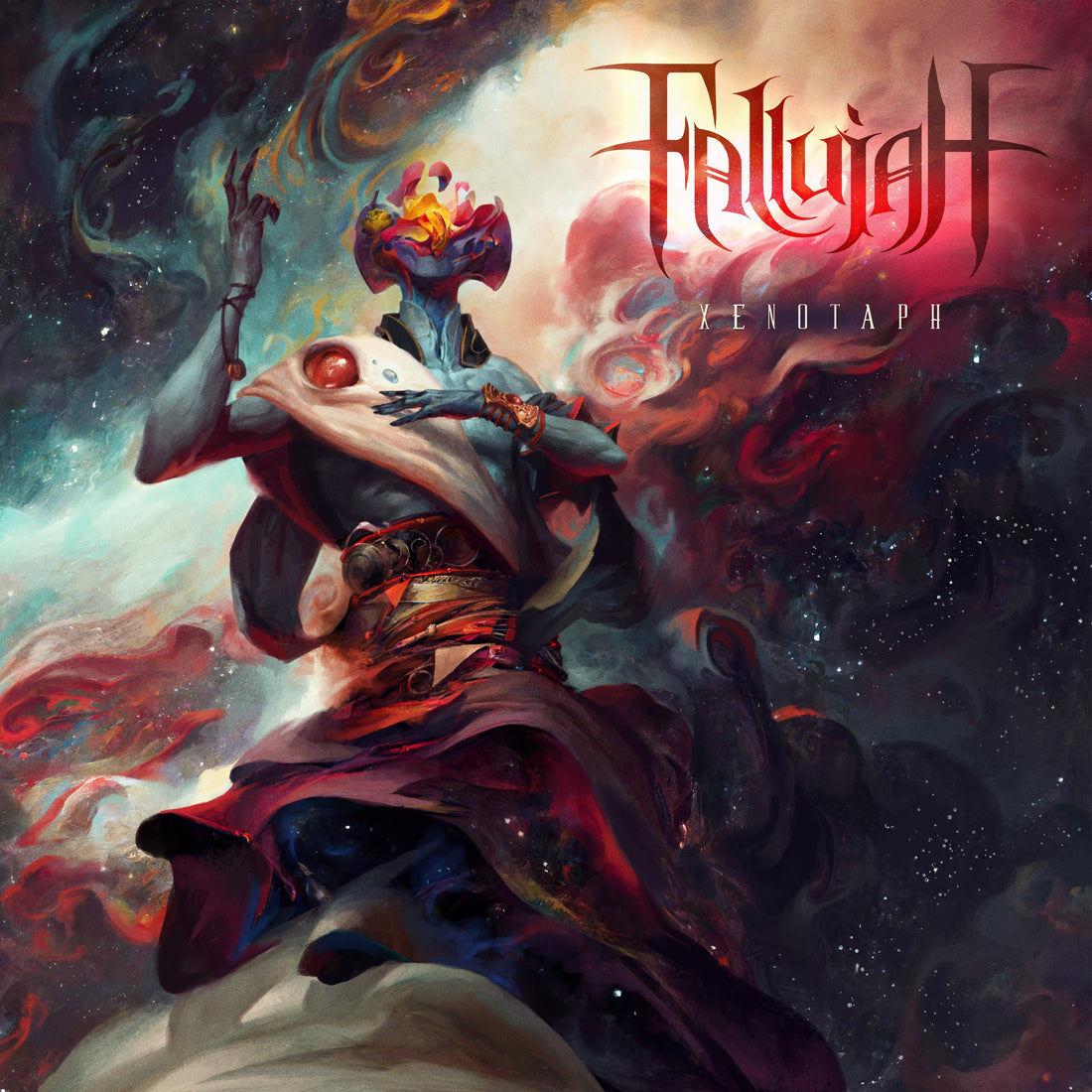
Fallujah’s Xenotaph is a sprawling, ambitious record that leans into atmosphere as much as technicality, delivering a listening experience that is as cinematic as it is aggressive. Known for their signature blend of technical death metal and ambient soundscapes, Fallujah once again blur the line between brutality and beauty. But on Xenotaph, that balance feels both more refined and more inconsistent, as if the band is caught between their ethereal aspirations and the raw weight their genre demands.
The album opens with “In Stars We Drown,” a track that immediately sets a contemplative, almost dreamlike tone. It begins with slow, spacious clean guitars and airy, melodic vocals that evoke a drifting sensation—like floating through the void. When the tech-death riffing finally emerges, it does so with restraint, almost hesitantly. The pacing is elegant and cinematic, but the emotional and sonic intensity doesn’t fully materialize until the bass finally cuts through the mix, grounding the composition with much-needed weight. This interplay between atmospheric grace and a slight lack of low-end punch becomes a recurring motif across the album.
Kaleidoscopic Waves follows with a more explosive and technically dazzling display. Here, Fallujah showcase their virtuosity with furious double-kick drumming, acrobatic fills, and intricate guitar work. The track shines brightest when the riffs break into relentless, chugging passages that contrast beautifully with the clean vocals—rich, dark, and commanding. Yet again, the bass remains noticeably thin, leaving the most brutal sections feeling less impactful than they should. It’s a recurring frustration: the precision is immaculate, the playing impressive, but the overall mix occasionally robs the music of its necessary heft.
That said, when the band allows more grit to bleed into their polished production, the payoff is immense. “Labyrinth of Stone” stands out for its sharper, thrashier edges. The unclean vocals here have more bite and urgency, while the clean singing continues to carry the emotional depth. The song thrives on this tension between harshness and beauty, giving it a sense of urgency that’s lacking in some of the more restrained tracks.
By the time “The Crystalline Veil” arrives, Fallujah begin to find the sweet spot between their celestial leanings and aggressive roots. This track weaves together shimmering synths, ambient textures, and a more pronounced bass presence, resulting in a sound that recalls early 2010s deathcore as much as it nods to modern progressive metal. The drumming remains a highlight—tight, expressive, and inventive—while the guitar work feels particularly inspired. It’s one of the few moments on the record where the band’s full vision feels fully realized.
The album's centerpiece, “Step Through the Portal and Breathe,” is a sprawling, multi-section journey that encapsulates Fallujah’s strengths and shortcomings in one ambitious track. It opens with soaring melodies and expansive clean passages before plunging into tightly executed tech-death riffing. The unclean vocals roar with power, and the composition’s dynamic structure demands attention. However, the familiar issue resurfaces: a lack of low-end punch that leaves some passages feeling more hollow than they deserve. Still, the sheer variety of ideas and emotional range within this song makes it a standout despite its flaws.
Not every experiment pays off. “A Parasitic Dream” feels like a fragmented sketch rather than a fully developed composition. The vocals are distant, the transitions jarring, and the atmosphere—while intriguing—never fully congeals. It’s a rare misstep that disrupts the album’s flow. Fortunately, the following track, “The Obsidian Architect,” pulls everything back together. With its djent-inspired riffs, eerie, alien-sounding vocal effects, and thunderous drumming, this song delivers one of the album’s most memorable moments. It’s inventive, cohesive, and confidently executed—a high point that reminds us what Fallujah can achieve when their elements lock into place.
The closing title track, “Xenotaph,” serves as a fitting culmination of the album’s journey. It brings together blistering riffs, a bass that finally feels weighty and grounded, and precise yet groovy drumming. Even when the song veers into more familiar tech-death territory, it does so with confidence and clarity, ending the album on a strong, assertive note.
Overall, Xenotaph is a record defined by contrasts—lush cinematic passages versus sometimes-buried harsh vocals, breathtaking technicality versus overly polished production, and moments of stunning cohesion alongside tracks that feel undercooked. Fallujah remain masters at weaving ambient beauty into technical death metal, but on Xenotaph, their celestial vision occasionally outpaces the raw power needed to fully land. Still, when they strike the right balance—as on “The Obsidian Architect” and “The Crystalline Veil”—they reaffirm why they’ve long stood out as one of the most distinctive voices in modern extreme metal.
Rating: 7/10
NOTABLE TRACKS:
The Crystalline Veil
Step Through the Portal and Breathe
The Obsidian Architect

